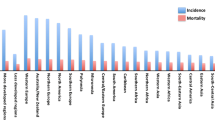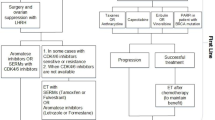Abstract
Integrin-linked kinase 1 (ILK1), a member of the serine/threonine kinases, has been demonstrated to be associated with numerous biological and pathological processes. However, the role of ILK1 in breast cancer has not been thoroughly elucidated. The purpose of this study was to assess ILK1 expression and to explore its contribution to breast cancer. The ILK1 mRNA expression was measured by real-time quantitative reverse transcriptase-polymerase chain reaction. In addition, ILK1 expression was analyzed by immunohistochemistry in 163 clinicopathologically characterized breast cancer cases. The relationship between ILK1 expression and clinicopathological features was analyzed by appropriate statistics. Kaplan–Meier analysis and Cox proportional hazard regression models were used to investigate the correlation between ILK1 expression and prognosis of breast cancer patients. The relative mRNA expression of ILK1 was significantly higher in breast cancer tissues than in adjacent noncancerous tissues (P < 0.001). In addition, ILK1 expression was significantly correlated with tumor size (P = 0.016), grade (P = 0.024), stage (P = 0.029), lymph node metastases (P = 0.007), and estrogen receptor status (P = 0.002). Kaplan–Meier analysis indicated that patients with high ILK1 expression had poor overall survival (P < 0.001). Multivariate analysis showed that high ILK1 expression was an independent predictor of overall survival. In conclusion, our data suggest for the first time that the increased expression of ILK1 in breast cancer is associated significantly with aggressive progression and poor prognosis. ILK1 may be an important molecular marker for predicting the carcinogenesis, progression, and prognosis of breast cancer.



Similar content being viewed by others
References
Honkoop AH, van Diest PJ, de Jong JS, Linn SC, Giaccone G, Hoekman K, et al. Prognostic role of clinical, pathological and biological characteristics in patients with locally advanced breast cancer. Br J Cancer. 1998;77:621–6.
Ring AE, Smith IE, Ashley S, Fulford LG, Lakhani SR. Oestrogen receptor status, pathological complete response and prognosis in patients receiving neoadjuvant chemotherapy for early breast cancer. Br J Cancer. 2004;91:2012–7. doi:10.1038/sj.bjc.6602235.
Cowin P, Welch DR. Breast cancer progression: controversies and consensus in the molecular mechanisms of metastasis and EMT. J Mammary Gland Biol Neoplasia. 2007;12:99–102. doi:10.1007/s10911-007-9041-9.
Naik AM, Fey J, Gemignani M, Heerdt A, Montgomery L, Petrek J, et al. The risk of axillary relapse after sentinel lymph node biopsy for breast cancer is comparable with that of axillary lymph node dissection: a follow-up study of 4008 procedures. Ann Surg. 2004;240:462–8. doi:10.1097%2F01.sla.0000137130.23530.19#pmc_ext. discussion 468–71.
Hannigan GE, Leung-Hagesteijn C, Fitz-Gibbon L, Coppolino MG, Radeva G, Filmus J, et al. Regulation of cell adhesion and anchorage-dependent growth by a new beta 1-integrin-linked protein kinase. Nature. 1996;379:91–6. doi:10.1038/379091a0.
Dedhar S. Cell-substrate interactions and signaling through ILK. Curr Opin Cell Biol. 2000;12:250–6.
Sawai H, Okada Y, Funahashi H, Matsuo Y, Takahashi H, Takeyama H, et al. Integrin-linked kinase activity is associated with interleukin-1 alpha-induced progressive behavior of pancreatic cancer and poor patient survival. Oncogene. 2006;25:3237–46. doi:10.1038/sj.onc.1209356.
Giancotti FG, Ruoslahti E. Integrin signaling. Science. 1999;285:1028–32. doi:10.1126/science.285.5430.1028.
Vespa A, D'Souza SJ, Dagnino L. A novel role for integrin-linked kinase in epithelial sheet morphogenesis. Mol Biol Cell. 2005;16:4084–95. doi:10.1091/mbc.E05-02-0087.
Troussard AA, McDonald PC, Wederell ED, Mawji NM, Filipenko NR, Gelmon KA, et al. Preferential dependence of breast cancer cells versus normal cells on integrin-linked kinase for protein kinase B/Akt activation and cell survival. Cancer Res. 2006;66:393–403. doi:10.1158/0008-5472.CAN-05-2304.
Filipenko NR, Attwell S, Roskelley C, Dedhar S. Integrin-linked kinase activity regulates Rac- and Cdc42-mediated actin cytoskeleton reorganization via alpha-PIX. Oncogene. 2005;24:5837–49. doi:10.1038/sj.onc.1208737.
Hannigan G, Troussard AA, Dedhar S. Integrin-linked kinase: a cancer therapeutic target unique among its ILK. Nat Rev Cancer. 2005;5:51–63. doi:10.1038/nrc1524.
Radeva G, Petrocelli T, Behrend E, Leung-Hagesteijn C, Filmus J, Slingerland J, et al. Overexpression of the integrin-linked kinase promotes anchorage-independent cell cycle progression. J Biol Chem. 1997;272:13937–44. doi:10.1074/jbc.272.21.13937.
Wu C, Keightley SY, Leung-Hagesteijn C, Radeva G, Coppolino M, Goicoechea S, et al. Integrin-linked protein kinase regulates fibronectin matrix assembly, E-cadherin expression, and tumorigenicity. J Biol Chem. 1998;273:528–36. doi:10.1074/jbc.273.1.528.
Li J, Zhang H, Wu J, Guan H, Yuan J, Huang Z, et al. Prognostic significance of integrin-linked kinase1 overexpression in astrocytoma. Int J Cancer. 2010;126:1436–44. doi:10.1002/ijc.24824.
Tu L, Liu Z, He X, He Y, Yang H, Jiang Q, et al. Over-expression of eukaryotic translation initiation factor 4 gamma 1 correlates with tumor progression and poor prognosis in nasopharyngeal carcinoma. Mol Cancer. 2010;9:78. doi:10.1186/1476-4598-9-78.
Liu Z, Li L, Yang Z, Luo W, Li X, Yang H, Yao K, Wu B, Fang W. Increased expression of MMP9 is correlated with poor prognosis of nasopharyngeal carcinoma.
Zhang L, Hao C, Shen X, Hong G, Li H, Zhou X, et al. Rank-based predictors for response and prognosis of neoadjuvant taxane-anthracycline-based chemotherapy in breast cancer. Breast Cancer Res Treat. 2013;139:361–9. doi:10.1007/s10549-013-2566-2.
Shulman LN, Willett W, Sievers A, Knaul FM. Breast cancer in developing countries: opportunities for improved survival. J Oncol. 2010;2010:595167. doi:10.1155/2010/595167.
Ali SM, Harvey HA, Lipton A. Metastatic breast cancer: overview of treatment. Clin Orthop Relat Res. 2003;(415 Suppl):S132-7
Miller KD, Sledge Jr GW. The role of chemotherapy for metastatic breast cancer. Hematol Oncol Clin North Am. 1999;13:415–34.
Karrison TG, Ferguson DJ, Meier P. Dormancy of mammary carcinoma after mastectomy. J Natl Cancer Inst. 1999;91:80–5. doi:10.1093/jnci/91.1.80.
Graff JR, Deddens JA, Konicek BW, Colligan BM, Hurst BM, Carter HW, et al. Integrin-linked kinase expression increases with prostate tumor grade. Clin Cancer Res. 2001;7:1987–91.
Okamura M, Yamaji S, Nagashima Y, Nishikawa M, Yoshimoto N, Kido Y, et al. Prognostic value of integrin beta1-ILK-pAkt signaling pathway in non-small cell lung cancer. Hum Pathol. 2007;38:1081–91. doi:10.1016/j.humpath.2007.01.003.
Ahmed N, Oliva K, Rice GE, Quinn MA. Cell-free 59 kDa immunoreactive integrin-linked kinase: a novel marker for ovarian carcinoma. Clin Cancer Res. 2004;10:2415–20. doi:10.1158/1078-0432.CCR-03-0042.
McDonald PC, Fielding AB, Dedhar S. Integrin-linked kinase—ssential roles in physiology and cancer biology. J Cell Sci. 2008;121:3121–32. doi:10.1242/jcs.017996.
Acknowledgments
This work was supported by Key Laboratory Diagnosis and Treatment Technology on Thoracic Oncology, Zhejiang Province, China.
This work was also supported by Natural Science Foundation of Zhejiang Province, China (No. Y12H160164 and No. Y2100681), Foundation of Science Technology Department of Zhejiang Province, China (No.2011C23043 and No.2012C23072), Traditional Chinese Medical Research Foundation of Zhejiang Province, China (No.2011ZA016), and Foundation of Science Technology Department of Hangzhou, Zhejiang Province, China(No.20110733Q04, and No.20110733Q21).
Conflict of interest
None.
Author information
Authors and Affiliations
Corresponding authors
Additional information
Hong-Jian Yang and Ya-Bing Zheng contributed equally to this work.
Rights and permissions
About this article
Cite this article
Yang, HJ., Zheng, YB., Ji, T. et al. Overexpression of ILK1 in breast cancer associates with poor prognosis. Tumor Biol. 34, 3933–3938 (2013). https://doi.org/10.1007/s13277-013-0981-y
Received:
Accepted:
Published:
Issue Date:
DOI: https://doi.org/10.1007/s13277-013-0981-y




